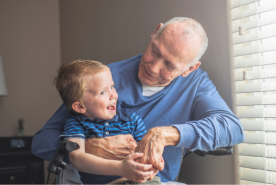January 19, 2023
For those diagnosed with kidney cancer, regular exercise can help alleviate depression, cancer-related fatigue, and muscle loss. No matter how you shake it, the benefits of fitness shouldn't be ignored. Barbara Treacher, a physical therapist who specializes in cancer, breaks it down, and Bruce Hill, a survivor of kidney cancer, shares his story.
Bruce Hill's kidney cancer experience
[VIDEO::http://www.youtube.com/watch?v=Bykn7_Syb2M::aVideoStyle]
In 2017, Bruce, an exercise enthusiast in his early forties, was on a hike when he realized he couldn't keep pace with his family: "I was working out with weights, doing calisthenics, and I played competitive soccer. So, when I couldn't keep up and felt winded, I knew something was wrong."
Bruce went to the doctor and a series of tests revealed a large tumor on his right kidney. The hospital quickly scheduled him for a radical nephrectomy surgery, removing his whole kidney alongside the tumor.
"The first few weeks at home were tough but my wife was instrumental in getting me up to walk, which was very helpful," said Bruce. "It made me feel stronger."
At the time, Bruce didn't know it but exercising before and after his surgery gave him the best possible route to recovery.
"One of the main issues when recovering from surgery is cardiovascular function. Doctors want you to get up right after surgery to make sure you don't get pneumonia," said Barbara. "Everyone about to go into surgery should do what they can to get as fit as possible, even if it's just walking. After surgery, people don't feel great and want to do nothing. While appealing, it's not the right thing to do for your body. You want to get your heart rate up."
Learn more about kidney cancer.
How exercise helps people with kidney cancer
[VIDEO::http://www.youtube.com/watch?v=kt2oMZnakQI::aVideoStyle]
The CDC1 recommends that adults with chronic conditions like kidney cancer survivors get at least 150 minutes of moderate-intensity aerobic exercise, like walking or swimming, per week and perform muscle-strengthening activities, like weight training or resistance band use, twice a week. Here's why.
Exercise helps people:
- Feel and sleep better
- Control weight
- Improve mental health
- Lessen the risk of early death
- Improve heart, muscle, and brain health
"A lot of cancer patients have some damage to their heart from treatment. Some patients experience cancer-related fatigue, anxiety, and depression. There can also be issues of weight loss and muscle wasting or weight gain from treatment," said Barbara. "Exercise can really counter all of those side effects."
Bruce experienced this firsthand.
"The tumor in my body consumed a lot of oxygen in my blood and I suffered from fatigue. Post-surgery, I was very slow to get my stamina back but I managed it by setting small exercise goals. Eventually, the fatigue went away," said Bruce. "I'm no evidence of disease right now and have been that way since early 2019. I've continued to stay fit, and I think exercise has had a positive impact.”
Keep reading about the benefits of exercise.
High-intensity interval training
Barbara encourages those with kidney cancer to try high-intensity interval training.
"That means getting your heart rate really high for short bursts of time, recovering for a few minutes, and then getting it back up," said Barbara. "I would encourage everyone to do higher intensity exercises a couple of times a week."
Don't let the words "high intensity" scare you. What gets your heart rate up is based on your current physical fitness.
"The rate of perceived exertion is a scale of one to ten where one is no exertion and ten is your absolute maximum. It's very individualized. For some, that might be walking in place. For others like Bruce, it's going to take more than that," Barbara said. "It's about small steps."
Not sure where to start? Here are 5 exercises that will put a spring in your step.
*This content is provided for informational use only and is not intended as medical advice or as a substitute for the medical advice of a healthcare professional. Always check with your healthcare team before starting any new physical activity.
Works Cited
1Center for Disease Control and Prevention. (2021, July 7). Adults with chronic health conditions and disabilities. Adults with Chronic Health Conditions and Disabilities. Retrieved December 19, 2022, from https://www.cdc.gov/physicalactivity/basics/chronic-health-conditions-and-disabilities.html


















